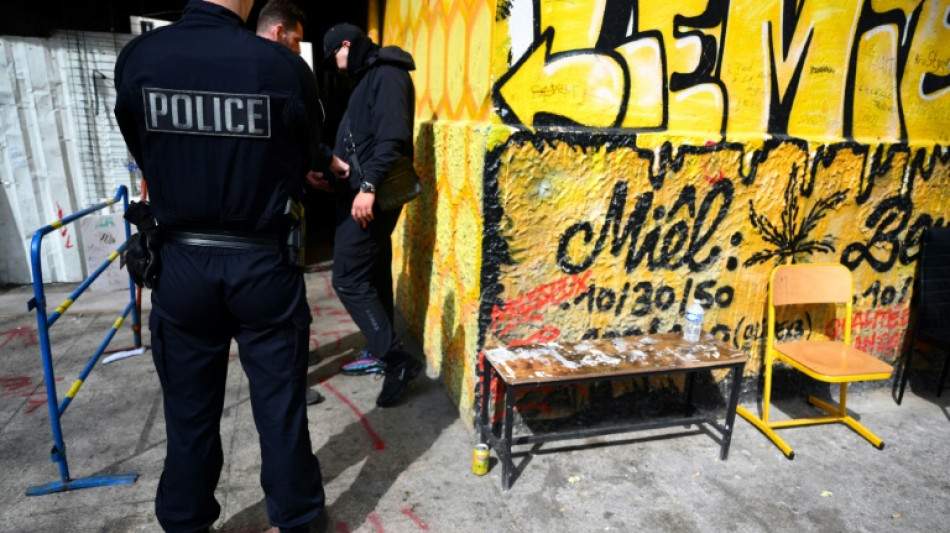
-
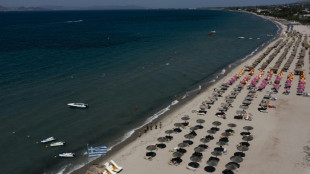 Greece set new tourism record in 2025
Greece set new tourism record in 2025
-
Zelensky says Ukraine unbroken after 4 years, but Russia vows to fight on
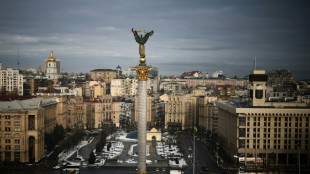
-
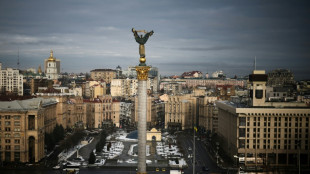 Zelenksy says Ukraine unbroken after 4 years, but Russia vows to fight on
Zelenksy says Ukraine unbroken after 4 years, but Russia vows to fight on
-
Snoop Dogg 'can't wait' for first Swansea visit

-
 Stocks fluctuate as traders assess AI fallout, tariffs
Stocks fluctuate as traders assess AI fallout, tariffs
-
Post-it maker 3M faces Belgian trial over 'forever' chemicals

-
 UK comedian Russell Brand pleads not guilty to new rape, assault charges
UK comedian Russell Brand pleads not guilty to new rape, assault charges
-
Duterte drew up 'death lists', boasted about murders: ICC prosecutor
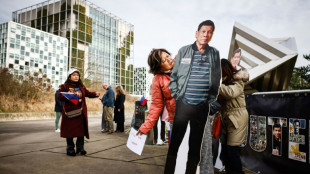
-
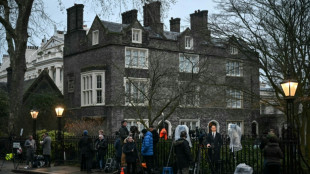 UK govt urged to release documents linked to ex-prince Andrew
UK govt urged to release documents linked to ex-prince Andrew
-
Rights group slams treatment of viral Japanese monkey

-
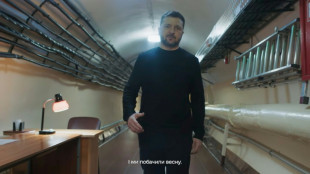 Inside the bunker where Zelensky led response to Russian invasion
Inside the bunker where Zelensky led response to Russian invasion
-
France demands explanation from US envoy over 'surprise' no-show
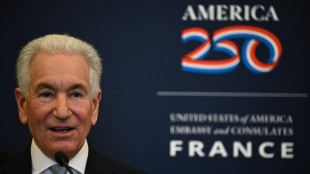
-
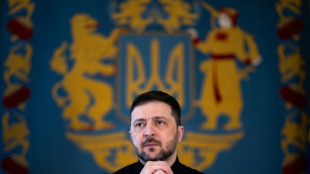 Putin failed to achieve goals in Ukraine, Zelensky says on war anniversary
Putin failed to achieve goals in Ukraine, Zelensky says on war anniversary
-
China tightens Japanese trade restrictions as spat worsens

-
 Ukraine war exhibition opens at Berlin Nazi bunker museum
Ukraine war exhibition opens at Berlin Nazi bunker museum
-
Jihadist threat puts eastern Senegal on edge
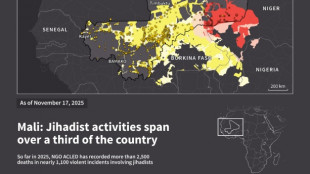
-
 Kim Yo Jong: the powerful sister behind North Korea's supreme leader
Kim Yo Jong: the powerful sister behind North Korea's supreme leader
-
North Korea ruling party promotes Kim Jong Un's younger sister

-
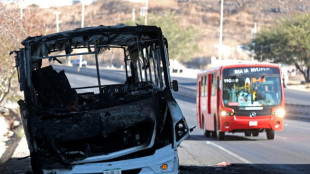 Mexico's Jalisco cautiously tries returning to normal after cartel violence
Mexico's Jalisco cautiously tries returning to normal after cartel violence
-
Mexico's violence-hit Guadalajara to host World Cup games
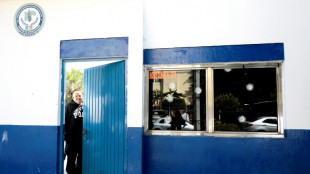
-
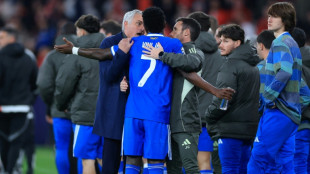 Mourinho's Bernabeu homecoming upended by suspension, racism row
Mourinho's Bernabeu homecoming upended by suspension, racism row
-
China targets Japanese companies over military ties

-
 Griezmann in talks to join MLS side Orlando City: source
Griezmann in talks to join MLS side Orlando City: source
-
France to revoke US envoy's govt access after summons no-show
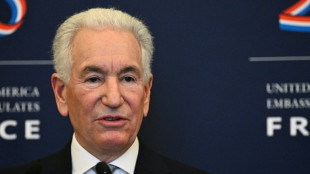
-
 Spurs overpower Pistons in clash of NBA's form teams
Spurs overpower Pistons in clash of NBA's form teams
-
Inoue to fight Nakatani in Tokyo in May: reports
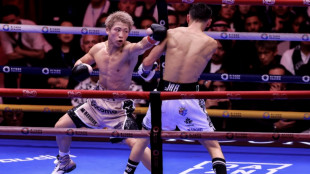
-
 Canada PM to push trade, rebuild fractured ties in India trip
Canada PM to push trade, rebuild fractured ties in India trip
-
Asian markets mixed as traders weigh AI and tariffs outlook

-
 Votes may 'melt like snow': Reform, Greens eye Labour UK bastion
Votes may 'melt like snow': Reform, Greens eye Labour UK bastion
-
Venezuela says exiles welcome to return following mass amnesty

-
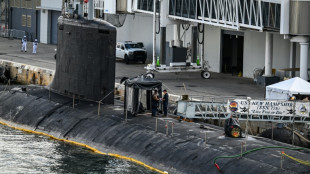 Australia buys parts for future AUKUS sub reactor
Australia buys parts for future AUKUS sub reactor
-
Ukraine marks four years since Russian invasion

-
 Brazil court to try politicians over hit on black councilwoman
Brazil court to try politicians over hit on black councilwoman
-
Interim president says Venezuelans welcome to return after amnesty law

-
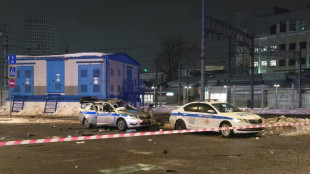 Man kills police officer in Moscow train station blast
Man kills police officer in Moscow train station blast
-
Despite drop in 2025, Russian oil exports exceed pre-war volumes: report

-
 ARIA Cybersecurity Announces Major Oil Refiner Deploys AZT PROTECT(TM)
ARIA Cybersecurity Announces Major Oil Refiner Deploys AZT PROTECT(TM)
-
Greene Concepts Announces Major Be Water Expansion in Walmart Stores Across the Southeast

-
 Fuse Battery Announces Amended Subscription Receipt Financing Details
Fuse Battery Announces Amended Subscription Receipt Financing Details
-
Lightwave Logic, Inc. Provides Update on Commercial Pipeline and Announces Timing of Fourth Quarter and Full Year 2025 Earnings Call

-
 Unlearn Advances Huntington's Disease AI Modeling Through Access to CHDI Foundation Data
Unlearn Advances Huntington's Disease AI Modeling Through Access to CHDI Foundation Data
-
Protagonist Therapeutics to Participate in Multiple Investment Bank Conferences in March 2026

-
 Specificity (OTCID:SPTY) to Present on the Emerging Growth Conference on February 26th, 2026.
Specificity (OTCID:SPTY) to Present on the Emerging Growth Conference on February 26th, 2026.
-
Havertys Reports Operating Results for Fourth Quarter 2025

-
 Viemed Healthcare Announces Year End 2025 Earnings Conference Call Details
Viemed Healthcare Announces Year End 2025 Earnings Conference Call Details
-
Galway Metals Drilling Intersects 9.0 g/t Gold Over 6.0m Beginning 15.0m from Surface at Southwest Deposit

-
 PeanutButterJelly Expands Affiliate Marketplace From 15 to 40 Affiliate Merchants; Website Sessions Rise 70%; Launches Conversion and Growth Optimization Plan
PeanutButterJelly Expands Affiliate Marketplace From 15 to 40 Affiliate Merchants; Website Sessions Rise 70%; Launches Conversion and Growth Optimization Plan
-
Digipower X Announces Uplisting to Cboe Canada

-
 Jaguar Mining Provides Update on Geologic Interpretation at the Chamé Gold Exploration Target, Brazil
Jaguar Mining Provides Update on Geologic Interpretation at the Chamé Gold Exploration Target, Brazil
-
Electrovaya Receives $10.5 Million P.O from Fortune 500 Customer


Teens lured to Marseille become 'slaves' of its drugs war
Marseille's drug lords have a problem. Last year 32 of their foot soldiers were shot dead in the crime-plagued French Mediterranean port city.
Thirteen more have died in gang shootings so far this year, with three killed and eight wounded in one night alone this week. With so much bloodshed, dealers cannot find enough locals willing to risk their lives selling drugs on the streets.
So they are luring often vulnerable teenagers from the rest of France, who are easily sacrificed, to fill the gap.
Many of the young recruits "find themselves reduced to a state of semi-slavery, held hostage and even tortured," the city's chief judge, Olivier Leurent, told AFP.
The mounting death toll in Marseille echoes similar explosions of extreme violence in Antwerp and Rotterdam, the ports through which most of Europe's cocaine is smuggled by gangs linked to the Mexican cartels.
By "outsourcing" street dealing to young, expendable outsiders known as "jobbeurs", Marseille's drug lords make sure "they won't know enough about the network to pass on information" if they are arrested, said Tiphanie Binctin, of the French police's anti-drug unit OFAST.
It all starts with ads on social media like Snapchat. "We need a lookout. Young, with a good memory for faces, respectful of customers. Helpful to be good on motorbikes. 10 am to 10 pm."
Having failed his exams, Zacharie* couldn't resist the lure of "easy money" and travelled south from the Paris region to be a lookout at one of Marseille's 130 known drug-dealing spots. "They pay most here," he told a judge.
- Tale of two cities -
Like him, most of the young "jobbeurs" arrive at Marseille's Saint Charles train station, with its staggering views towards the blue of the Mediterranean.
But they do not get a chance to take in the old town, or the wealthy seaside suburbs that lead to the spectacular azur coves of the Calanques. Instead, they are taken directly to the notorious north of the city, to some of Europe's poorest and most crime-infested estates.
Their names may be redolent of bucolic old Provence -- La Marine Bleue, Les Oliviers (the Olive Trees) -- but gangs have such a hold here they even have checkpoints filtering traffic in and out of the estates.
Marseille's judges say four out of 10 minors they now see in drug cases come from outside the city.
And it is teenagers -- some as young as 14 -- who are on the front line of the city's vicious drugs war.
A 17-year-old was beaten and stabbed to death on the Paternelle estate in February by a mob of 30, the gruesome murder filmed by the killers before being posted on social media.
This week a 16-year-old was gunned down there, and a 14-year-old badly wounded by fire from an assault rifle.
- 'The French Connection' -
The stakes are high. Some of the city's dealing spots turn over 80,000 euros a day, with police scattering 12 customers queuing up to buy drugs during one recent swoop.
The roots of the drugs trade in France's second city are long and deep, and the gangs that control it are highly sophisticated.
Marseille's Corsican drugs mafia controlled most of the heroin that was smuggled into the United States from the 1930s to the 1970s, when "The French Connection" -- which gave its name to the Hollywood film -- was finally dismantled.
But the criminal underworld, which has since switched to cocaine and cannabis, continues to have a strong hold in France's poorest city.
Despite the spiralling risks, there seems to be no shortage of young recruits willing to work for the gangs.
"It's better than being a street walker," Cindy*, 21, told police after she was arrested.
"I had to work to get my daughter back."
The dealers put her up in a hotel when she arrived in Marseille from her village in the Herault.
Others have not been so lucky, according to the police, forced to sleep on balconies, in basements or next to bins.
"It's pure exploitation," said children's judge Laurence Bellon, with teens having to work long hours and take huge risks.
Even so, some youths making "1,400 euros a week for working seven days in a row... think they have made it and are earning a fortune," said Marseille's prosecutor Dominique Laurens.
- Torture -
But the reality is very different.
The young outsiders are more vulnerable and "less well paid and well treated than locals", said lawyer Valentin Loret, who has represented some of them. And when police catch them with drugs and cash they fall in the debt trap, with "the gangs demanding they pay them back".
Migrants from Algeria and Nigeria have also been recruited, thinking they were being hired to work on building sites, he added.
Marseille "is no Eldorado", said Frederique Camilleri, the region's top law enforcement official. "It's violence, fake debts, torture and acts of barbarity. It is being at the mercy of the gangs."
Their control is total, with teenagers punished for not counting the cash quickly enough or for failing to raise the alert fast enough when the police appear.
A 16-year-old who had run away to Marseille from a children's home in Chartres in central France was found unconscious after being tortured with a burning torch for selling a small amount of pot without permission.
One of his torturers, also then underage, was jailed for 10 years in November.
Another minor was recently put on a train back to his home by the authorities only to be intercepted at the next station by dealers because he had a "debt" to repay.
Many of the cases verge on human trafficking, said Judge Bellon.
One group of teenagers recruited online were locked up, beaten and tortured for no apparent reason after their arrival in the city during the pandemic in 2020.
One of the boys, who was 15 at the time, was raped by a young dealer and blackmailed with a sex tape to keep him quiet -- a tactic the gangs often use, according to a judicial source.
- 'Paupers in designer labels' -
Yet some vulnerable young people are still willing to put their lives at risk for a few hundred euros.
With many having dropped out of school at 11, said Judge Bellon, they cling onto the "designer clothes (they buy from dealing) as only part of their identity they can put forward.
"They are paupers in designer labels," said one of their lawyers, shocked by a client oblivious to the risks he was taking as he strutted around in a coat worth several hundred euros.
The conspicuous consumption of social media influencers and series like "Narcos" that glamorise the drug world seem to justify their lives, the authorities argue.
While police struggle to reach out to the teens, or work their way up the chain of command, some end up running to them when things get desperate.
In December, a young man who feared he was about to be kidnapped jumped onto a bus and begged passengers to help him. A month later another climbed onto the roof of a tower block and pleaded with the emergency services to rescue him, a police source said.
- 'Mexicanisation' -
Prosecutor Laurens said she feared "a worsening of the situation, with a shift to what some South American countries are experiencing -- a Mexicanisation" -- even if the number of deaths is not comparable.
Judge Bellon is equally worried. "It is more than lawlessness," she told AFP.
"It sometimes reminds me of an image we have of Brazil, where there is a complete divide between wealthy neighbourhoods and those where there is extreme poverty and hyper violence."
Despite the spiralling violence, some young "jobbeurs" like Zacharie -- arrested only three days after he arrived in Marseille -- have managed to free themselves from the clutches of the gangs.
He was spared jail, thanks to the intervention of his mother, but was banned from the city for his own good for three years.
As the prosecutor wryly put it, "the local climate didn't suit him".
* The names of the young people have been changed to protect them from reprisals.
F.Dubois--AMWN



